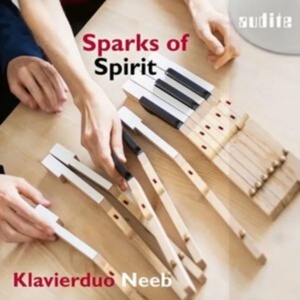
Sparks of Spirit
Franz Schubert (1797-1828)
8 Variations on an original theme in A-flat major, D.813 (1824)
Johann Sebastian Bach (1685-1750)
Concerto for two harpsichords in C minor, BWV.1062 (1736, arr. Vincent Neeb)
Max Reger (1873-1916)
Cinq pièces pittoresques, Op 34 (1899)
Sergei Rachmaninov (1873-1943)
Suite No 2, Op 17 (1900-01)
Klavierduo Neeb
rec. 2023, Sendesaal, Bremen, Germany
Audite 97814 [64]
This is the Klavierduo Neeb’s second release; their first disc featured works with percussion (Audite 97813 review) but here sister and brother Sophie and Vincent go it alone. They open with Schubert’s delightful Variations on an original theme, written in the summer of 1824 when the composer was briefly distracted from the reality of his declining health by his engagement to teach the Princesses Maria and Caroline Esterházy at the Esterházy country residence in what was then Hungary. The sunny nature of these variations is just one expression of his secret feelings for the Princess Caroline; I say sunny but the jaunty little march theme is bittersweet at times and this continues into the variations. Though these include standard variation fare – triplets in the first and seventh, semiquaver runs in the second and fourth and a minor key variation that hints at the slow movement of Beethoven’s seventh symphony – the craft and imaginative writing is a far cry from the note-spinning fluff that was the fashion of the age. I love the youthful liveliness of the Neeb’s playing who bring glorious buoyancy to the rhythms and wonderful clarity in their interplay.
On the first disc they included their own transcription of the allegro from Mozart’s C major Piano Concert K.467 and they continue with Vincent’s arrangement of Bach’s Concerto for two keyboards and strings BWV.1062, itself an arrangement by Bach of his concerto for two violins in D minor. Its clean lines and sparkling rhythms are captured marvellously by the duo in their unfussy performance. They skip forward to a composer who greatly admired and was influenced by Bach, Max Reger and his pièces pittoresques. These five pieces were written at Reger’s parents’ house where he was recovering from the debilitating toll that military service and alcohol had had upon him and the time spent there must have done him a power of good if these engaging and humorous pieces are anything to go by. Like most of his early works for four hand these are dances and exuberant ones at that; Reger’s characteristically rich texture, rather Brahmsian at times, does nothing to dampen their high spirits and rambunctious nature. The first is a rollicking burlesque with a comic, almost drunken, tripping gait that the Neeb siblings respond to magnificently as they do in the fast symphonic waltz, no.2, the scherzo-like no.3, the enigmatic slow waltz and swirling fast waltz of no.4 that combine toward the end and the dazzling fireworks of the final piece that for all its complex virtuosity ends in tranquillity. These are doubtless the least familiar pieces in this recital and I was very happy to make their acquaintance.
They end on two pianos once more with Rachmaninov’s second suite, composed in that fertile period that also produced the C minor Piano Concerto and the Cello Sonata. Although the March isn’t as driven as it is often heard it is still vigorous the duo bring plenty of light and shade. The winners here for me are the Romance, Rachmaninov’s early and passionate love duet and the Tarantelle finale that is muscular and dazzling, full of rhythmic snap but with space to breathe in its more lyrical moments.
The recorded sound here is excellent and the program is well thought out. The optimistic music of composers emerging from darker times is a nice connecting theme and if the Bach connection is mainly to Reger it is also a personal one to the duo themselves through the transcription. The programme is titled Sparks of Spirit and spirit is clear in every note of the playing, oozing with joy and character. A lovely recital.
Rob Challinor
If you purchase this recording using a link below, it generates revenue for MWI and helps us maintain free access to the site



















